新概念英语1课堂笔记
(完整版)新概念英语第一册笔记完整版
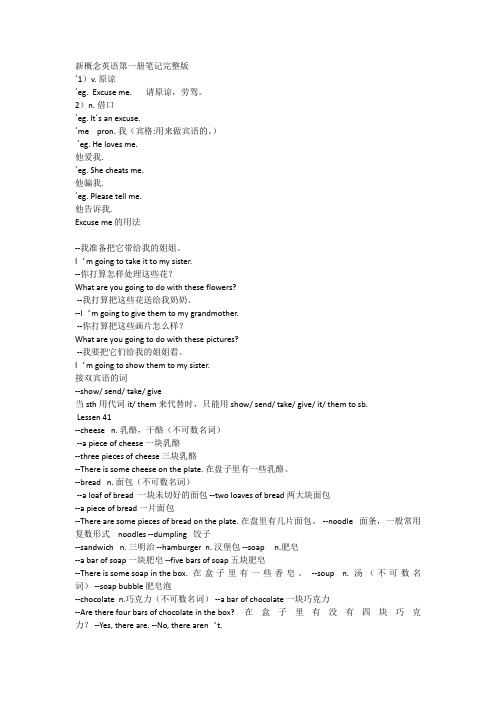
新概念英语第一册笔记完整版΄1)v. 原谅΄eg. Excuse me. 请原谅,劳驾。
2)n. 借口΄eg.It΄s an excuse.΄me pron. 我(宾格:用来做宾语的。
)΄eg. He loves me.他爱我.΄eg. She cheats me.他骗我.΄eg. Please tell me.他告诉我.Excuse me 的用法--我准备把它带给我的姐姐。
I‘m going to take it to my sister.--你打算怎样处理这些花?What are you going to do with these flowers?--我打算把这些花送给我奶奶。
--I‘m going to give them to my grandmother.--你打算把这些画片怎么样?What are you going to do with these pictures?--我要把它们给我的姐姐看。
I‘m going to show them to my sister.接双宾语的词--show/ send/ take/ give当sth 用代词it/ them 来代替时,只能用show/ send/ take/ give/ it/ them to sb.Lessen 41--cheese n. 乳酪,干酪(不可数名词)--a piece of cheese 一块乳酪--three pieces of cheese 三块乳酪--There is some cheese on the plate. 在盘子里有一些乳酪。
--bread n. 面包(不可数名词)--a loaf of bread 一块未切好的面包 --two loaves of bread 两大块面包--a piece of bread 一片面包--There are some pieces of bread on the plate. 在盘里有几片面包。
新概念英语1课堂笔记

新概念英语1课堂笔记一、单词部分。
1. be动词(am/is/are)- 用法:- am用于第一人称单数I,例如:I am a student.(我是一名学生。
)- is用于第三人称单数(he/she/it和单数名词),如:He is a doctor.(他是一名医生。
),The cat is cute.(这只猫很可爱。
)- are用于第二人称you(单复数同形)以及复数名词和代词,例如:You are my friends.(你们是我的朋友。
),They are teachers.(他们是老师。
)2. 名词(noun)- 可数名词:- 有单复数形式,复数形式的构成规则:- 一般情况加 -s,如book - books,pen - pens。
- 以s, x, ch, sh结尾的加 -es,如bus - buses,box - boxes,watch - watches,brush - brushes。
- 以辅音字母 + y结尾的,把y变为i再加 -es,如baby - babies,city - cities。
- 以f或fe结尾的,把f或fe变为v再加 -es,如knife - knives,wife - wives(但也有一些特殊情况,如roof - roofs)。
- 不可数名词:- 没有复数形式,例如water(水),milk(牛奶),bread(面包)等。
在表示数量时,要用相应的量词词组,如a glass of water(一杯水),a piece of bread (一片面包)。
3. 形容词(adjective)- 用法:用来修饰名词,说明事物或人的特征。
例如:a beautiful flower(一朵美丽的花朵),a tall boy(一个高个子男孩)。
- 形容词的位置:一般放在名词前面,但在某些结构中也可以后置,如something interesting(一些有趣的东西)。
4. 代词(pronoun)- 人称代词:- 主格:I(我),you(你/你们),he(他),she(她),it(它),we(我们),they(他们/她们/它们)。
新概念完美课堂笔记

新概念完美课堂笔记一、单词部分。
1. pen [pen]- 词性:名词,意为“钢笔”。
- 例句:This is my pen.(这是我的钢笔。
)- 拓展:pencil(铅笔),eraser(橡皮)。
2. pencil ['pensl]- 词性:名词,“铅笔”。
- 例句:I write with a pencil.(我用铅笔写字。
)- 注意:pencil的复数形式是pencils,直接加 -s。
3. book [bʊk]- 词性:名词,“书”。
- 例句:There are many books on the desk.(桌子上有很多书。
)- 相关短语:bookstore(书店),bookcase(书架)。
二、课文部分(以Lesson 1 - Excuse me为例)1. 课文原文。
- Excuse me!- Yes?- Is this your handbag?- Pardon?- Is this your handbag?- Yes, it is.- Thank you very much.2. 语法点。
- 一般疑问句:Is this your handbag?这是一个一般疑问句,其结构是“be动词(is/are/am)+主语+其他”。
在这个句子中,is是be动词,this是主语,your handbag是表语。
回答一般疑问句时,用yes或no开头,然后主语和be动词保持一致。
例如:Yes, it is.(肯定回答)或者No, it isn't.(否定回答)- 单词“pardon”:在这里表示“请再说一遍”,当没有听清楚对方的话时可以使用。
3. 重点词汇用法。
- excuse:- 在这里“excuse me”是一个常用的礼貌用语,用于引起他人注意或者表示歉意。
- 还可以作动词,意为“原谅”,例如:Excuse my bad handwriting.(请原谅我糟糕的书写。
)- handbag:名词,“手提包”,是由hand(手)和bag(包)组成的合成词。
新概念英语(一)课堂笔记59课
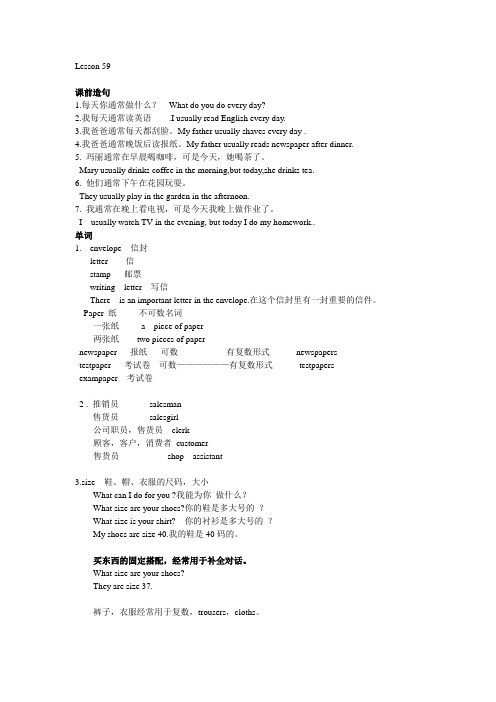
Lesson 59课前造句1.每天你通常做什么?What do you do every day?2.我每天通常读英语.I usually read English every day.3.我爸爸通常每天都刮脸。
My father usually shaves every day .4.我爸爸通常晚饭后读报纸。
My father usually reads newspaper after dinner.5. 玛丽通常在早晨喝咖啡,可是今天,她喝茶了。
Mary usually drinks coffee in the morning,but today,she drinks tea.6. 他们通常下午在花园玩耍。
They usually play in the garden in the afternoon.7. 我通常在晚上看电视,可是今天我晚上做作业了。
I usually watch TV in the evening, but today I do my homework..单词1.envelope 信封letter 信stamp 邮票writing letter 写信There is an important letter in the envelope.在这个信封里有一封重要的信件。
Paper 纸不可数名词一张纸 a piece of paper两张纸two pieces of papernewspaper 报纸可数___________有复数形式newspapers testpaper 考试卷可数——————有复数形式testpapers exampaper 考试卷2 . 推销员salesman售货员salesgirl公司职员,售货员clerk顾客,客户,消费者customer售货员shop assistant3.size 鞋、帽、衣服的尺码,大小What can I do for you ?我能为你做什么?What size are your shoes?你的鞋是多大号的?What size is your shirt? 你的衬衫是多大号的?My shoes are size 40.我的鞋是40码的。
新概念英语第一册课堂笔记pdf
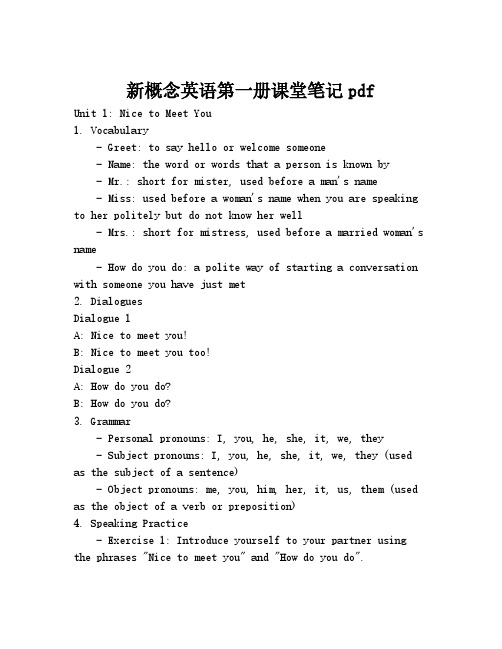
新概念英语第一册课堂笔记pdfUnit 1: Nice to Meet You1. Vocabulary- Greet: to say hello or welcome someone- Name: the word or words that a person is known by- Mr.: short for mister, used before a man's name- Miss: used before a woman's name when you are speaking to her politely but do not know her well- Mrs.: short for mistress, used before a married woman's name- How do you do: a polite way of starting a conversation with someone you have just met2. DialoguesDialogue 1A: Nice to meet you!B: Nice to meet you too!Dialogue 2A: How do you do?B: How do you do?3. Grammar- Personal pronouns: I, you, he, she, it, we, they- Subject pronouns: I, you, he, she, it, we, they (used as the subject of a sentence)- Object pronouns: me, you, him, her, it, us, them (used as the object of a verb or preposition)4. Speaking Practice- Exercise 1: Introduce yourself to your partner using the phrases "Nice to meet you" and "How do you do".- Exercise 2: Practice using the subject pronouns in sentences.Unit 2: What's Your Name?1. Vocabulary- Name: the word or words that a person is known by- Surname: the name that you share with other members of your family; last name- Christian name: the name given to you when you were baptized, especially if you are a Christian- First name: the name that you have from birth, that comes before your family name- Middle name: a name that is between your first name and your family name- Full name: your first name, any middle names, and your family name- Initials: the first letters of each of your names, used as a short way of writing your full name2. DialoguesDialogue 1A: What's your name?B: My name is John Smith.Dialogue 2A: What's your full name?B: My full name is Mary Jane Johnson.3. Grammar- Interrogative pronouns: what, which, who, whom, whose - Wh-questions: questions that begin with "wh-" words and expect information as an answer4. Speaking Practice- Exercise 1: Ask your partner for their full name using the question "What's your full name?"- Exercise 2: Practice asking and answering questions with different interrogative pronouns.Unit 3: Where are You From?1. Vocabulary- Nationality: the legal relationship between a person and a country- Country: an area of land that has its own government, army, etc- City: a large and important town- Town: a place where people live and work, that is smaller than a city- Village: the smallest type of town where people live in the countryside- Capital: the most important city in a country, where the government is based2. DialoguesDialogue 1A: Where are you from?B: I'm from China.Dialogue 2A: What's your nationality?B: I'm French.3. Grammar- Verb to be: am, is, are- Present simple: the form of a verb used to describe actions that regularly happen or facts that are always true 4. Speaking Practice- Exercise 1: Ask your partner where they are from using the question "Where are you from?"- Exercise 2: Practice using the verb "to be" in sentences about nationality and origin.(Note: The content above is a sample and does not fully cover the entire document "新概念英语第一册课堂笔记pdf".)。
新概念英语一笔记
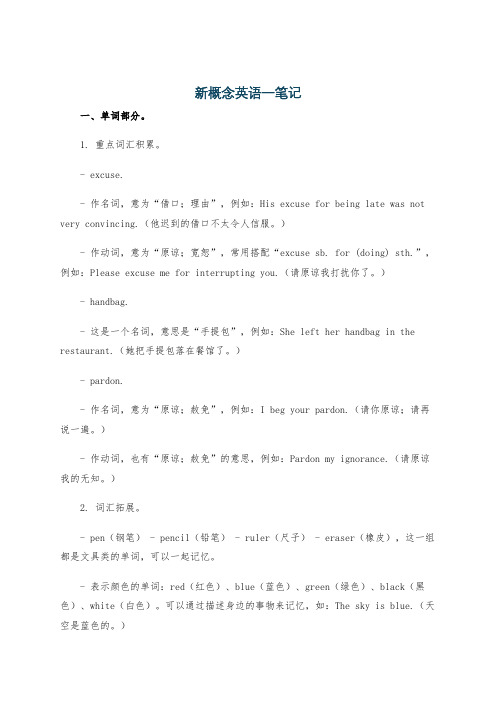
新概念英语一笔记一、单词部分。
1. 重点词汇积累。
- excuse.- 作名词,意为“借口;理由”,例如:His excuse for being late was not very convincing.(他迟到的借口不太令人信服。
)- 作动词,意为“原谅;宽恕”,常用搭配“excuse sb. for (doing) sth.”,例如:Please excuse me for interrupting you.(请原谅我打扰你了。
)- handbag.- 这是一个名词,意思是“手提包”,例如:She left her handbag in the restaurant.(她把手提包落在餐馆了。
)- pardon.- 作名词,意为“原谅;赦免”,例如:I beg your pardon.(请你原谅;请再说一遍。
)- 作动词,也有“原谅;赦免”的意思,例如:Pardon my ignorance.(请原谅我的无知。
)2. 词汇拓展。
- pen(钢笔) - pencil(铅笔) - ruler(尺子) - eraser(橡皮),这一组都是文具类的单词,可以一起记忆。
- 表示颜色的单词:red(红色)、blue(蓝色)、green(绿色)、black(黑色)、white(白色)。
可以通过描述身边的事物来记忆,如:The sky is blue.(天空是蓝色的。
)二、语法部分。
1. 一般现在时。
- 概念:表示经常发生的动作或存在的状态。
- 结构:- 主语为第三人称单数(he/she/it等)时,动词要加 -s或 -es。
例如:He likes reading books.(他喜欢读书。
)- 主语为第一人称(I)、第二人称(you)和复数(they/we等)时,动词用原形。
例如:I play football every Sunday.(我每个星期天踢足球。
)- 时间状语:often(经常)、usually(通常)、sometimes(有时候)、every day(每天)等。
新概念英语第一册课堂笔记
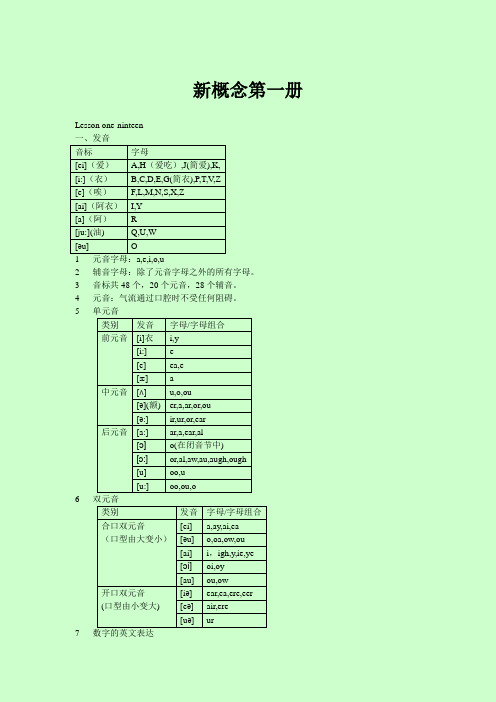
新概念第一册Lesson one-ninteen一、发音音标字母[ei](爱)A,H(爱吃),J(简爱),K,[i:](衣)B,C,D,E,G(简衣),P,T,V,Z[e](唉)F,L,M,N,S,X,Z[ai](阿衣)I,Y[a](阿)R[ju:](油) Q,U,W[əu] O1元音字母:a,e,i,o,u2辅音字母:除了元音字母之外的所有字母。
3音标共48个,20个元音,28个辅音。
4元音:气流通过口腔时不受任何阻碍。
5单元音类别发音字母/字母组合前元音[i]衣i,y[i:] e[e] ea,e[æ] a中元音[ʌ] u,o,ou[ə](额) er,a,ar,or,ou[ə:] ir,ur,or,ear后元音[a:] ar,a,ear,al[ɔ]o(在闭音节中)[ɔ:]or,al,aw,au,augh,ough[u] oo,u[u:] oo,ou,o6双元音类别发音字母/字母组合合口双元音(口型由大变小)[ei] a,ay,ai,ea [əu] o,oa,ow,ou [ai] i,igh,y,ie,ye [ɔi]oi,oy [au] ou,ow开口双元音(口型由小变大) [iə] ear,ea,ere,eer [eə] air,ere[uə] ur7数字的英文表达eleven 11,twelve 12,thirteen 13,fourteen 14,fifteen 158辅音:气流通过口腔时受到一些阻碍。
8.1清辅音:发音时声带不震动。
清辅音的分类例子,[]半元音j,w边音l鼻音m,n,ŋ爆破音p,b,t,d,k,g摩擦音f,v,θ, ∫,s,z,h,r,ʒ破擦音[t∫]吃, [dʒ]支,tr,dr,ts,dz8.2浊辅音:发音时声带震动。
[b],[d],[g],[v],[z]9开音节单词:以元音字母结尾,或者,辅音字母+不发音的e结尾。
10闭音节单词:以辅音字母结尾。
11单数和复数11.1定冠词a/an(后面的名词元音音素开头用定冠词用an,后面的名词辅音音素开头用定冠词用a,)11.2单数复数变化规则●一般名词后面加s●以sh,s,x,ch结尾的,后面加es。
新概念英语第一册笔记完整版
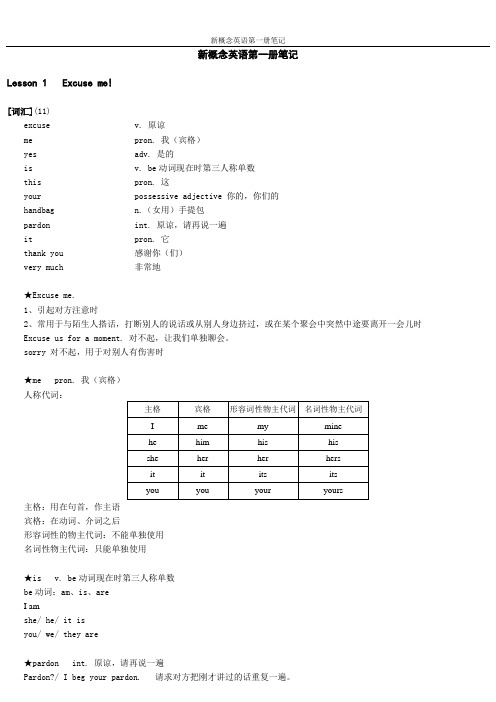
新概念英语第一册笔记Lesson 1 Excuse meexcuse v. 原谅me pron. 我(宾格)yes adv. 是的is v. be动词现在时第三人称单数this pron. 这your possessive adjective 你的,你们的handbag n.(女用)手提包pardon int. 原谅,请再说一遍it pron. 它thank you 感谢你(们)very much 非常地★Excuse me.1、引起对方注意时2、常用于与陌生人搭话,打断别人的说话或从别人身边挤过,或在某个聚会中突然中途要离开一会儿时Excuse us for a moment. 对不起,让我们单独聊会。
sorry 对不起,用于对别人有伤害时★me pron. 我(宾格)人称代词:主格:用在句首,作主语宾格:在动词、介词之后形容词性的物主代词:不能单独使用名词性物主代词:只能单独使用★is v. be动词现在时第三人称单数be动词:am、is、areI amshe/ he/ it isyou/ we/ they are★pardon int. 原谅,请再说一遍Pardon?/ I beg your pardon. 请求对方把刚才讲过的话重复一遍。
[语法]含有be动词的陈述句、否定句和一般疑问句含有be动词的任何句子,否定句就是在be动词后面加not;如果变一般疑问句,就把be动词提前到句子的前面。
[课文]Excuse me.Yes?Is this your handbag?Pardon?Is this your handbag?Yes, it is.Thank you very much.Lesson 2 Is this your…?[词汇](10)pen n.钢笔pencil n.铅笔book n.书watch n.手表coat n.上衣,外衣dress n.连衣裙skirt n.裙子shirt n.衬衣car n.小汽车house n.房子★dress① n. 连衣裙;套裙②n. 服装,衣服casual dress 便服evening dress 晚礼服★house n.房子house 房子,一般指独立的院落,更具体的指房子的建筑,结构family 侧重家庭的成员There are four people in my family. 在我家里有四口人。
新概念英语第一册(Lesson1)学习笔记-全
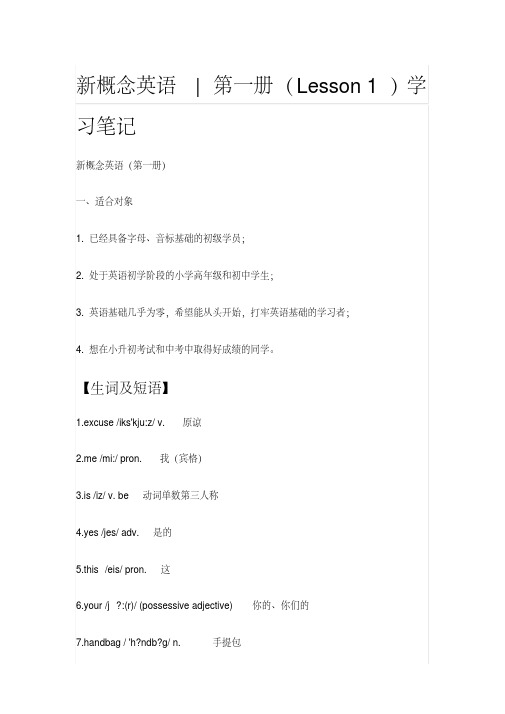
新概念英语| 第一册(Lesson 1)学习笔记新概念英语(第一册)一、适合对象1. 已经具备字母、音标基础的初级学员;2. 处于英语初学阶段的小学高年级和初中学生;3. 英语基础几乎为零,希望能从头开始,打牢英语基础的学习者;4. 想在小升初考试和中考中取得好成绩的同学。
【生词及短语】1.excuse /iks'kju:z/ v. 原谅2.me /mi:/ pron. 我(宾格)3.is /iz/ v. be 动词单数第三人称4.yes /jes/ adv. 是的5.this /eis/ pron. 这6.your /j?:(r)/ (possessive adjective) 你的、你们的7.handbag / 'h?ndb?g/ n. 手提包8.pardon /'pɑ:dn/ int. 原谅,请再说一遍9.It /it/ pron. 它10.thank you /θ??k-ju:/ 感谢你(们)11.very much / 'veri-m?t?/ 非常【课文解析】1.Excuse me!这是常用于表示道歉的客套话,相当于汉语中的“劳驾”、“对不起”。
当我们要引起别人的注意、要打搅别人或者打断别人的话时,通常都可以使用这个表达方式。
(1)引起别人的注意:eg:Excuse me,is this your handbag?(2)要打扰某人或打断别人说话:eg:Excuse me,may I ask you a question?(3)向某人借东西eg. Excuse me,can I borrow your pen?(4)Excuse me,can I borrow your …?—Ok,here you are.—Sorry,I don’t have.2.yes? /jes/(1)adv. 是的(用于一般疑问句的肯定回答)eg: Are you a student? 你是一名学生么?Yes,I am. 是的,我是。
新概念英语第一册笔记(完整版)
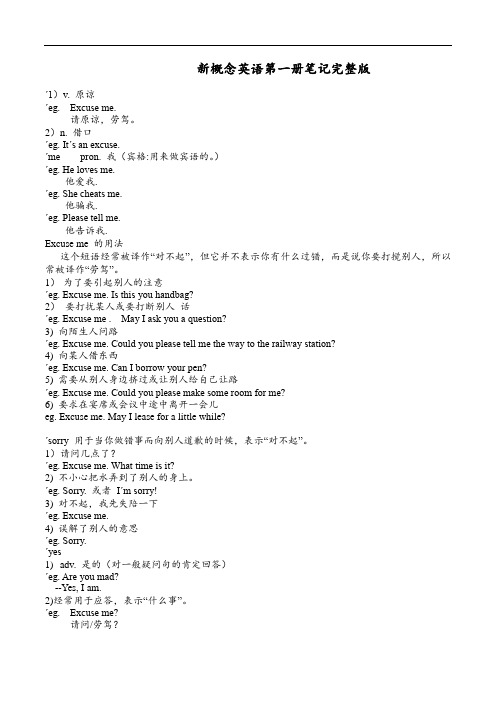
新概念英语第一册笔记完整版΄1)v. 原谅΄eg. Excuse me.请原谅,劳驾。
2)n. 借口΄eg. It΄s an excuse.΄me pron. 我(宾格:用来做宾语的。
)΄eg. He loves me.他爱我.΄eg. She cheats me.他骗我.΄eg. Please tell me.他告诉我.Excuse me 的用法这个短语经常被译作“对不起”,但它并不表示你有什么过错,而是说你要打搅别人,所以常被译作“劳驾”。
1)为了要引起别人的注意΄eg. Excuse me. Is this you handbag?2)要打扰某人或要打断别人话΄eg. Excuse me . May I ask you a question?3) 向陌生人问路΄eg. Excuse me. Could you please tell me the way to the railway station?4) 向某人借东西΄eg. Excuse me. Can I borro w your pen?5) 需要从别人身边挤过或让别人给自己让路΄eg. Excuse me. Could you please make some room for me?6) 要求在宴席或会议中途中离开一会儿eg. Excuse me. May I lease for a little while?΄sorry 用于当你做错事而向别人道歉的时候,表示“对不起”。
1)请问几点了?΄eg. Excuse me. What time is it?2) 不小心把水弄到了别人的身上。
΄eg. So rry. 或者I΄m sorry!3) 对不起,我先失陪一下΄eg. Excuse me.4) 误解了别人的意思΄eg. Sorry.΄yes1)adv. 是的(对一般疑问句的肯定回答)΄eg. Are you mad?--Yes, I am.2)经常用于应答,表示“什么事”。
新概念课堂笔记 第一册 Lesson

新概念英语课堂笔记第一册 Lesson 13-14【译文】到楼上来吧。
【用法】注意本句中连词and的用法。
虽然它一般译为“和〞 ,但在此却不必翻译 ,因为它连接的是两个有先后关联的动作 ,并且都是瞬间发生的 ,用and 连接表示动作的连贯与关系。
That’s a nice dress. It's very smart.【译文】这件连衣裙真好看 ,真漂亮。
【用法】nice的含义与用法○1美好的 ,好看的:It is a nice skirt.○2和蔼的 ,友好的:You are very nice to be my friend.○3使人快乐的 ,令人愉快的:Have a nice trip.【用法】what colour是一个特殊疑问词组 ,用来引导特殊疑问句 ,意为“什么颜色〞。
类似的特殊疑问词组还有:What make...? What nationality…?What number…?What class…?祈使句【介绍】以动词原形开头的句子为祈使句。
【用法】〔1〕祈使句的主语通常不直接表示出来 ,其谓语动词用原型。
祈使句用来表示请求、建议、命令、叮嘱等。
如:Follow me. 跟我来。
Shut the door, please. 请关门。
Look out! 留神! Help yourself. 请自己动手。
Keep off the grass! 请勿践踏草地!〔2〕某些祈使动词可以后跟and和另一个祈使动词 ,而不是后跟带to的动词不定式结构: Come and see this goldfish.来看这条金鱼。
〔不用 Come to see〕Go and buy yourself a new pair of shoes. 去给自己买双新鞋吧。
〔不用 Go to buy〕 Wait and see. 等着瞧吧。
〔不用 Wait to see〕2 / 2。
新概念课堂笔记 第一册 Lesson 1-2
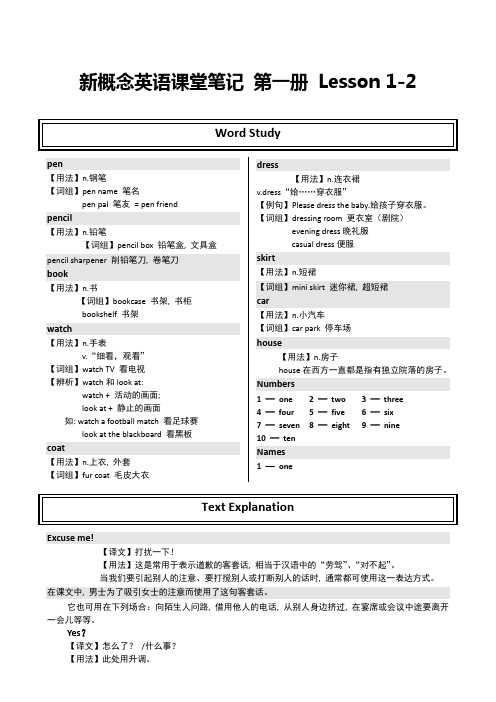
新概念英语课堂笔记第一册Lesson 1-2pen【用法】n.钢笔【词组】pen name 笔名pen pal 笔友= pen friendpencil【用法】n.铅笔【词组】pencil box 铅笔盒, 文具盒pencil sharpener 削铅笔刀, 卷笔刀book【用法】n.书【词组】bookcase 书架, 书柜bookshelf 书架watch【用法】n.手表v.“细看,观看”【词组】watch TV 看电视【辨析】watch和look at:watch + 活动的画面;look at + 静止的画面如: watch a football match 看足球赛look at the blackboard 看黑板coat【用法】n.上衣, 外套【词组】fur coat 毛皮大衣dress【用法】n.连衣裙v.dress“给……穿衣服”【例句】Please dress the baby.给孩子穿衣服。
【词组】dressing room 更衣室(剧院)evening dress晚礼服casual dress便服skirt【用法】n.短裙【词组】mini skirt 迷你裙, 超短裙car【用法】n.小汽车【词组】car park 停车场house【用法】n.房子house在西方一直都是指有独立院落的房子。
Numbers1 —one2 —two3 —three4 —four5 —five6 —six7 —seven 8 —eight 9 —nine10 —tenNames1 —oneExcuse me!【译文】打扰一下!【用法】这是常用于表示道歉的客套话, 相当于汉语中的“劳驾”、“对不起”。
当我们要引起别人的注意、要打搅别人或打断别人的话时, 通常都可使用这一表达方式。
在课文中, 男士为了吸引女士的注意而使用了这句客套话。
它也可用在下列场合:向陌生人问路, 借用他人的电话, 从别人身边挤过, 在宴席或会议中途要离开一会儿等等。
新概念英语第一册笔记(注释)1~10
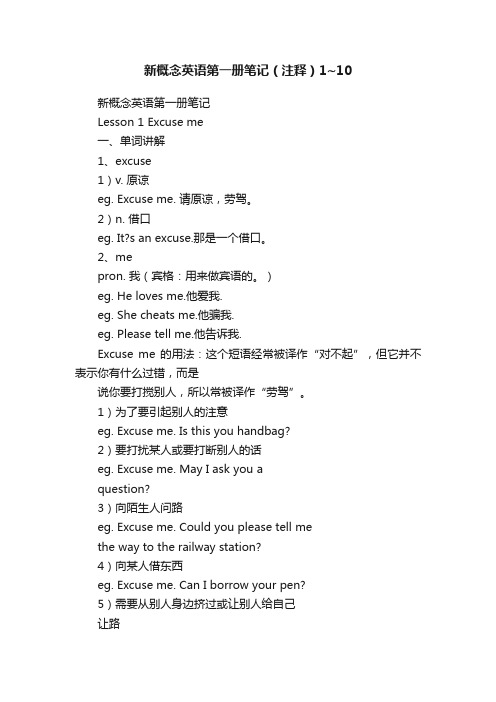
新概念英语第一册笔记(注释)1~10新概念英语第一册笔记Lesson 1 Excuse me一、单词讲解1、excuse1)v. 原谅eg. Excuse me. 请原谅,劳驾。
2)n. 借口eg. It?s an excuse.那是一个借口。
2、mepron. 我(宾格:用来做宾语的。
)eg. He loves me.他爱我.eg. She cheats me.他骗我.eg. Please tell me.他告诉我.Excuse me 的用法:这个短语经常被译作“对不起”,但它并不表示你有什么过错,而是说你要打搅别人,所以常被译作“劳驾”。
1)为了要引起别人的注意eg. Excuse me. Is this you handbag?2)要打扰某人或要打断别人的话eg. Excuse me. May I ask you aquestion?3)向陌生人问路eg. Excuse me. Could you please tell methe way to the railway station?4)向某人借东西eg. Excuse me. Can I borrow your pen?5)需要从别人身边挤过或让别人给自己让路eg. Excuse me. Could you please makesome room for me?6)要求在宴席或会议的途中离开一会儿eg. Excuse me. May I lease for a little while?对不起打扰一下,我可以离开一会吗?eg. Excuse us for a moment.比较sorry 用于当你做错事而向别人道歉的时候,表示“对不起”。
1)请问几点了?eg. Excuse me. What time is it?2)不小心把水弄到了别人的身上。
eg. Sorry. 或者I?m sorry!3)对不起,我先失陪一下eg. Excuse me.4)误解了别人的意思eg. Sorry.3、yes1)adv. 是的(对一般疑问句的肯定回答)eg. Are you mad?Yes, I am.2)经常用于应答,表示“什么事”。
新概念英语第一册课堂笔记
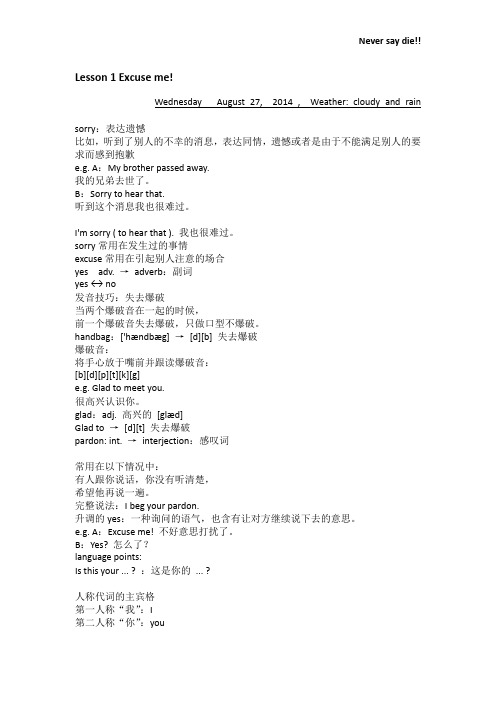
Lesson 1 Excuse me!Wednesday August 27, 2014 , Weather: cloudy and rainsorry:表达遗憾比如,听到了别人的不幸的消息,表达同情,遗憾或者是由于不能满足别人的要求而感到抱歉e.g. A:My brother passed away.我的兄弟去世了。
B:Sorry to hear that.听到这个消息我也很难过。
I'm sorry ( to hear that ). 我也很难过。
sorry常用在发生过的事情excuse常用在引起别人注意的场合yes adv. → adverb:副词yes ↔ no发音技巧:失去爆破当两个爆破音在一起的时候,前一个爆破音失去爆破,只做口型不爆破。
handbag:['hændbæg] → [d][b] 失去爆破爆破音:将手心放于嘴前并跟读爆破音:[b][d][p][t][k][g]e.g. Glad to meet you.很高兴认识你。
glad:adj. 高兴的 [glæd]Glad to → [d][t] 失去爆破pardon: int. → interjection:感叹词常用在以下情况中:有人跟你说话,你没有听清楚,希望他再说一遍。
完整说法:I beg your pardon.升调的yes:一种询问的语气,也含有让对方继续说下去的意思。
e.g. A:Excuse me! 不好意思打扰了。
B:Yes? 怎么了?language points:Is this your ... ? :这是你的 ... ?人称代词的主宾格第一人称“我”:I第二人称“你”:you第三人称“Ta”:?he/she/it主谓宾结构:主语 + 谓语 + 宾语主语:一个动作的发出者宾语:一个动作的承受人;对象e.g. I love you. 我爱你I (代词)→ 主语love (动词)→ 谓语you(代词)→宾语你爱我You love me. √me:表示作宾语的“我”在主谓宾结构中,宾语位置上放上“我”这个代词,选择me I → 代词“我”的“主格”me→ 代词“我”的“宾格”e.g. 我爱妈妈:I love mum. / I love mummy. /I love her.形容词性物主代词:表示所属关系对应汉语里面的“我的”,“你的”,“Ta的”使用形容词性物主代词你的短裙 your skirt我的钢笔my pen指示代词this:这,这里 th:[ð]句型This is … :这是 ...e.g. This is a car. 这是一辆小汽车。
Lesson143144课堂笔记新概念英语第一册
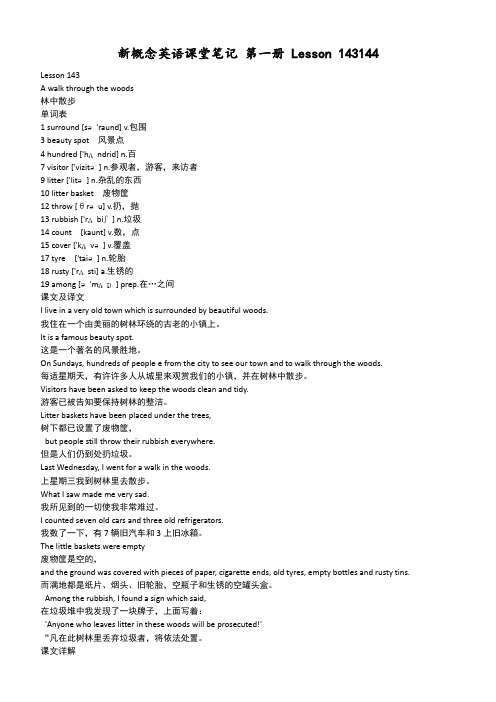
新概念英语课堂笔记第一册 Lesson 143144Lesson 143A walk through the woods林中散步单词表1 surround [sə'raund] v.包围3 beauty spot 风景点4 hundred ['hʌndrid] n.百7 visitor ['vizitə] n.参观者,游客,来访者9 litter ['litə] n.杂乱的东西10 litter basket 废物筐12 throw [θrəu] v.扔,抛13 rubbish ['rʌbiʃ] n.垃圾14 count [kaunt] v.数,点15 cover ['kʌvə] v.覆盖17 tyre ['taiə] n.轮胎18 rusty ['rʌsti] a.生锈的19 among [ə'mʌŋ] prep.在…之间课文及译文I live in a very old town which is surrounded by beautiful woods.我住在一个由美丽的树林环绕的古老的小镇上。
It is a famous beauty spot.这是一个著名的风景胜地。
On Sundays, hundreds of people e from the city to see our town and to walk through the woods.每适星期天,有许许多人从城里来观赏我们的小镇,并在树林中散步。
Visitors have been asked to keep the woods clean and tidy.游客已被告知要保持树林的整洁。
Litter baskets have been placed under the trees,树下都已设置了废物筐,but people still throw their rubbish everywhere.但是人们仍到处扔垃圾。
- 1、下载文档前请自行甄别文档内容的完整性,平台不提供额外的编辑、内容补充、找答案等附加服务。
- 2、"仅部分预览"的文档,不可在线预览部分如存在完整性等问题,可反馈申请退款(可完整预览的文档不适用该条件!)。
- 3、如文档侵犯您的权益,请联系客服反馈,我们会尽快为您处理(人工客服工作时间:9:00-18:30)。
6. invite [in’vait] v.邀请 邀请eg.Did they invite you?他们邀请你了 邀请 他们邀请你了 吗? 7.anything[‘eniθiŋ] pron. 任何东西 eg. I want something to eat, anything will do.I’m dying. 我想吃点东西, 随便什么都行。我快要饿死了。 我想吃点东西 随便什么都行。我快要饿死了。 8.nothing [‘nʌθiŋ] pron. 没有东西 没有事情 没有一点儿 没有东西, 没有事情, ʌ eg.Nothing in the world is difficult for one who sets his mind into it. 世上无难事, 只怕有心人。 世上无难事 只怕有心人。 9.lemonade [,lemə’neid] n. 柠檬汽水 eg.She makes lemonade with lemons. 她用柠檬做柠檬汁。 她用柠檬做柠檬汁。 10.joke[dʒәuk] v. 开玩笑 戏弄 开玩笑, eg.Don't be unhappy, I was only joking. 不要生气, 我只是开玩笑。 不要生气 我只是开玩笑。
lesson115. Knock,knock! 敲敲门! 敲敲门! new words: 1.anyone[‘eniwʌn] pron.任何人 无论谁 用于疑问句,否定句) 任何人, 用于疑问句, ʌ 任何人 无论谁(用于疑问句 否定句) 2.knock[nɔk] vt. & vi.敲, 击, 打 ɔ 敲 eg. Please knock before entering. 进来前先敲门。 进来前先敲门。 3.everything[‘evriθiŋ] pron. 每件事 一切 每件事, eg.You must do everything carefully.你必须仔细地做每一件 你必须仔细地做每一件 事。 4.quiet[‘kwaiət]adj.轻声的 安静的 轻声的, 轻声的 eg. It was so quiet that you could hear a pin drop. 安静得连掉一根针的声音都听得见。 安静得连掉一根针的声音都听得见。 5.impossible[im’pɔsəbl] adj. 不可能的 办不到的 不可能的, ɔ eg.They want to do the almost impossible thing. 他们想干几乎不可能干成的事。 他们想干几乎不可能干成的事。 It is impossible for the ants to eat the elephant . 对于这群蚂蚁来说,吃掉这头大象是不可能的。 对于这群蚂蚁来说,吃掉这头大象是不可能的。
